Tim Cook on Angela Merkel
‘Raised in an era of repression, stagnation and surveillance in East Germany, she has not wasted one breath of free air’Tim Cook has been the CEO of Apple since 2011. Here, he nominates German chancellor Angela Merkel.

She has been an unshakable cornerstone of the European project. She has been a visionary advocate for carrying forward the fundamental right to privacy into the digital age. She has been a steady economic hand during years of crisis and rising uncertainty. And she has shown steadfast commitment to the values of freedom, inclusivity and the rule of law amid Europe’s migration crisis. Through every twist and turn, through every seemingly intractable challenge, she has come out looking wiser, more prudent and more durable than those who have doubted her.
Not merely a trailblazer as Germany’s first female leader, she has become a great standard-bearer for what leadership ought to look like. In many instances, she could have made a much easier path for herself by banging on the podium and finding scapegoats, in trading long-term prosperity for short-term advantage. But she knows what lurks at the end of that road, and she has never been willing to take even a single step down it.
I was fortunate to meet her for the first time in 2015, and every time we’ve met since then she has been quick to flash that small, knowing smile, eyes crinkling with the conviction and confidence of a leader who has seen worse – and who knows, even when surrounded by doubters, that we are headed somewhere better. I admire her greatly, and I wish we had more like her.
Amal Clooney on Maria Ressa
‘She is a journalist who has chosen to risk her life to do her job and we are all better off as a result’
Maria Ressa is 5ft 2in, but she stands taller than most in her pursuit of the truth. Like any journalist in the Philippines, she has two choices: toe the government line and be safe; or risk her life to do her job. She has chosen the latter, and we are all better off as a result.
Maria is a Filipino-American woman who became CNN’s bureau chief in south-east Asia. Seven years ago, she teamed up with three female colleagues to set up the online news website Rappler. And very quickly it made waves.
Rappler is now one of the most influential sites in the Philippines, and, like any responsible journalist, Maria has been critical of the government’s record. Rappler has published reports on corruption by President Duterte’s administration, his weaponisation of social media to silence critics, and his support for death squads that have reportedly murdered more than 27,000 Filipinos in the name of a war on drugs. The authorities have responded with the full weight of the state. Duterte has vilified Maria’s reporting as “fake news”. He has helped amplify online attacks against her, and Rappler at one point had its operating licence revoked.
Duterte’s administration is now pursuing Maria through a series of prosecutions that seek to criminalise alleged sales of her company’s stocks to a foreign entity, and directly target her reporting with charges of criminal libel. She now faces a sentence of up to 63 years behind bars. According to Maria’s local lawyers, this is the first time in recent history that such laws have been used to target a journalist in one of Asia’s oldest democracies. But it is a sign of things to come.
This is why, Maria has told me, she has to defend herself against the charges. When I first met her, she was out on bail – as she is today – speaking at a conference in New York. When she asked me to act as her lawyer, I asked whether there was any judge in the Philippines who could be fair and independent enough to acquit her. She was not sure. I asked whether anyone other than Duterte would have the power to pardon her? They did not. Despite these odds, she went home. And I took the case. Because, as Maria explained, she is “holding up the ceiling” for anyone else who dares to speak.
Doing so is already dangerous. The UN has found that there has been a “deterioration of the human rights situation” under Duterte, including through the repeated targeting of journalists. The president has called journalists “spies” and warned that they are “not exempted from assassination”. If Maria, a US citizen, can now be locked up for doing her work, the message to other journalists and independent voices is clear: be quiet, or you’ll be next.
Maria’s struggle is one that defines our times. Data gathered in the last few years shows more journalists being imprisoned and killed than at any time since records began, threatening the very foundations of democracy and a free society. Authoritarian leaders have every advantage over those they try to intimidate, yet people like Maria are fighting back.
Maria is speaking truth to power. She is holding up the ceiling for others. If it comes crashing down, I will do all I can to get her out.
Micah White on Vitalik Buterin
‘People told me Occupy was a bad idea. Vitalik’s cryptocurrency will defy people in the same way’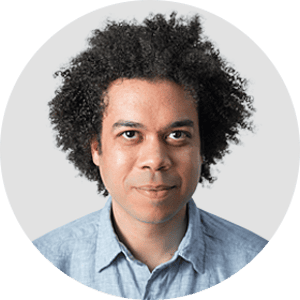
In activism, it’s hard to break out of the consensus – to propose a new idea, and not let being shut down stop you. Vitalik Buterin has done just that. He’s only 25. He invented Ethereum when he was 19 and studying Bitcoin. He basically wanted to embed a computer inside money, via programs known as smart contracts. The idea was rejected by the Bitcoin community, but he pushed forward, and now Ethereum is one of the decade’s most promising technologies for social change.
Vitalik is interested in how technology can be used for good. The Bitcoin community couldn’t care less about that; they’re just trying to make money. When I met Vitalik, he asked, “Do you think we’re going to be able to tokenise natural resources?” What he meant was: can we take a natural resource and represent it as a cryptocurrency, so that the value of the coin increases if the resources are protected? This is a whole different direction for environmental activism.
Ethereum is a system of smart contracts that are completely binding – they are unchangeable and publicly verifiable. Key aspects of international agreements, such as the Paris agreement to combat climate change, could be more easily enforced if people could tell when promises had been broken. You’d be shifting power away from corruptible international organisations. In that sense, Vitalik is at the forefront of a new wave of globalism.
In the future we’ll see other activists creating new forms of money that embody their economic ideals. I dream of redistributive currencies that automatically share a portion of each transaction with everyone in the economy. A lot of the ideas that have been floating around the left, like the Robin Hood tax on financial transactions, are hard to implement in the real world but easy to implement with a cryptocurrency. Imagine the reaction when governments realise global social movements are using Ethereum in ways that we never predicted.
The most impactful changes come from the places that we least expect. When we came up with Occupy Wall Street, everyone told me it was a bad idea and they weren’t interested. I see a similar reaction with Ethereum: people can’t see its potential, and that is why it will defy them.
Emma Watson on Marai Larasi
‘My abiding memory of the Globes? We picked tarot cards together and she wore the best shoes’
Marai Larasi is mother to Ikamara and Jahred, but she is a mother to many. She is the person on the frontline of the issues I care about in the UK – from feminism to LGBTQI+ rights. Throughout this decade, Marai has supported and championed women who have survived unimaginable abuses. She is there for people who have no one and nothing, in their hardest moments.
Who knows what’s going to happen in the next decade? If the apocalypse comes, I’d ride into battle in her wake. This would definitely make her laugh because she is the least violent person I know, in word, gesture and thought, even though she speaks beautifully about rage. She is all sorts of beautiful contradictions.
She is contained, having carefully learned to wield her energy. She knows when to use it and when not to, and knows that “no” is a complete sentence. She is passionately vegan, in the funniest, least self-aggrandising or patronising way possible. She just cocks her head sideways at people as if to say, “What on earth are they doing, eating animals?” She’s a neat freak. Whatever Marie Kondo is on, Marai is on, too. Again, if the apocalypse comes, I’m hiding out in Marai’s room. She is heavy and light, old and young, an anvil that’s fluid.
My abiding memory of attending the Golden Globes with Marai? Two things. We picked tarot cards before we went, and she wore the best shoes I’ve ever seen. I bought her fluffy Birkenstocks as a thank you gift, which her children think are an abomination. I am told she wears them anyway.
I wish I could name the single most impactful thing she has done over the last decade, but I haven’t known her long enough, and she is notoriously modest, rarely speaking about all that she is juggling. Personally, though, it was probably something incredibly simple she said to me the first time we met. We were at Imkaan and she introduced herself as a black lesbian feminist. Why, I asked, did she feel the need to define herself this specifically? She answered and later sent me an Audre Lorde quote explaining that it is our differences that make us more powerful, not weaker. Knowing our experiences are different doesn’t fracture us; it makes us more intimate, stronger, more connected.
I find her presence in the world profoundly comforting. I’ve never met a woman I felt had more of the answers.
Kevin Systrom and Mike Krieger on Yann LeCun
‘If you see a self-driving car, or scan a cheque with your bank’s app – that’s all down to Yann’
Kevin Systrom When Mike and I left, we asked, “What’s had the most effect on Instagram over the years?” And we both agreed it was machine learning. Yann LeCun is one of the very few people to move it from being a buzzword to something that really mattered to companies and academics alike. Machine learning revolutionised Instagram, from suggesting friends to follow, to watching out for objectionable content.
Image recognition wouldn’t be possible without Yann’s work. It has transformed all sorts of industries. Being able to look at satellite data and understand global warming, or content on Instagram that needs to be followed up by law enforcement – the things that keep people safe or transform the world in a meaningful way wouldn’t be possible without him.

The whole area of how AI can keep us safe online will continue to be important as the amount of content posted on all of these networks grows. In the next 10 years, Yann will be able to take machine learning from something that was typically done on very large computers to something that runs on people’s phones. It can help you take better photos because it knows what’s in the image; it can help you solve all kinds of problems.
Jameela Jamil on Tarana Burke
‘I’m a sexual assault survivor and Tarana’s work has given me a sense of community’
Tarana Burke is a woman who has used her own sexual assault as a tool to help and empower other survivors. She has dedicated her life to it. I don’t think enough people recognise how extraordinary she is. A lot of very famous women were credited [for #MeToo and Time’s Up] and, while I’m not undermining them, I do think the way in which we celebrated the movement could have included Tarana more. I didn’t come across her work until a couple of years ago, because of her lack of privilege, and it’s such vital work for our generation and the generations after.
There has been tremendous, palpable progress with #MeToo and Time’s Up, and the topic is now mainstream. People who perhaps weren’t well versed in the nuance of consent are now looking back on their own sexual history and wondering what they could have done to be more sensitive. It has changed sex. That’s enormous in terms of an impact.
I’m a sexual assault survivor, and Tarana’s work has meant the world to me because I feel a sense of community. She has afforded us a dignity and the right to speak out. There was a moment where women started to push back against men who claimed they were victims of sexual assault, too, and Tarana was one of the first people to step out and say #MeToo is for everyone. This isn’t just a women’s movement: this is for all survivors.
A lot of people have stopped talking about #MeToo; we see less of the Time’s Up logo, and conversations have moved on. But she hasn’t. She goes to schools and talks to children. She is invested in the next generation, and I think that’s truly the path to change.
Caitlyn Jenner on Jane Fonda
‘Jane and I had skin cancer at the same time. I admired how she did press with a bandage on’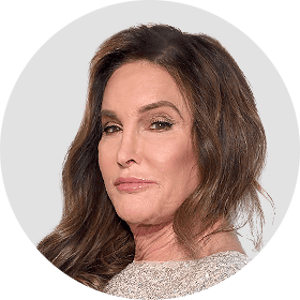
I want to applaud Jane Fonda’s work as a female activist. She is setting a great example, at 81, that age shouldn’t stop you standing up for what you believe in. Her activism on Capitol Hill, to fight climate change, is making the world a better place for younger generations, and setting an example for them, as well. I admire her commitment to a cause that is so important for our future.
Jane and I went through a skin cancer scare at the same time. Hers was on her lip and mine was on my nose. Growing up in the 50s and 60s, sunscreen wasn’t a big thing. My parents weren’t lathering me up with SPF before I played outside. I admire how Jane had no qualms about doing press with a bandage on her face and speaking out about what she was going through.
In 2005, [alongside Gloria Steinem and Robin Morgan] Jane founded the Women’s Media Center, a nonprofit organisation whose goal is to ensure women are represented in the media. Diversity in film and TV is an important cause to me, and I have been working on trans representation these past few years.
It’s notable that Jane’s activism began long before this decade. She started speaking out on politics in the 1970s, and hasn’t stopped being vocal about race equality, women’s rights and the environment, whatever the consequences. The world is a better place with her in it.
Solange Knowles on Toyin Ojih Odutola
‘We met as babies on Tumblr. Her early work – using ballpoint, charcoal – speaks loud and clear’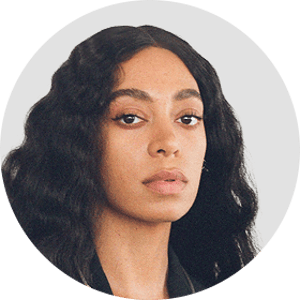
Toyin Ojih Odutola is one of the most profound and masterfully skilled visual storytellers of my generation. Her drawings take the lives of the noble, the proud, the gentle and grounded, and make them all exceptional characters who speak to you from out of the frame. She dismantles the myths of “representation” and exhibits them in a language which is truly her own.
We first met in 2011 as little babies on Tumblr. When I saw her images for the first time I was stunned and moved, and emailed her to tell her. We’ve been friends ever since. Each year I learn more and more from her – she is boundless. I remember seeing All These Garlands Prove Nothing VIII at the Jack Shainman Gallery in New York in 2013, and the eyes followed me around everywhere I went. There were so many confrontations and complexities about identity that spoke to me and pierced me.
Toyin is passionate and honest, and the most intelligent woman I know. She does not apologise for any of it. She dedicates herself to her work like no one else I’ve seen, and both takes up and protects the space she deserves. When I’m on the straw I think is my last, she always says something to remind me of my power. But within all of it, there is a beautiful, nurturing kindness that is so genuine and true. I strive to be more like her every day.
Prior to creating my film When I Get Home, Toyin and I would often speak about the limitlessness of blackness as a dimension, a space and universe. I was very comfortable with the palette I had been using, and comforted by the light and lightness in my work, but it couldn’t have been further from where life was taking me. Toyin helped me reimagine and lean into the vastness and endlessness of blackness, and embrace that in film making.
I remember her saying, “How do I make that whiteness ‘other’, so that it’s no longer a black mark on a white ground but the other way around?” Even in Toyin’s early works, the materials she used – black ballpoint, graphite and charcoal – all speak very loud and clear to this. I thank her for ushering in new considerations of all the endless possibilities and ways to emphasise blackness.
Lena Dunham on Mary Karr
‘Time with Mary, though rare, leaves me dancing down the street. She writes as if her hair is on fire’
When you hear the word changemaker, there are some obvious visuals: a politician visiting a foreign climate in a hazmat suit. The inventor of a cancer drug doing something with beakers. Someone testifying before Congress, loudly yelling, “I object, sir!” then emerging triumphant on to grey stone steps. But what of the quiet, private change that happens in mundane places, in church basements and on street corners with a cup of coffee, and sitting in sticky pleather chairs in a doctor’s waiting room, a comforting hand on a shaking back? What about the people who quietly rescue others every day and, in a beautiful twist, tell no one?
Mary Karr is a writer, memoirist and poet whose book The Liar’s Club burst on to the scene in 1995, sitting on the New York Times bestsellers list for over a year. In it, Karr details her appallingly rough childhood with the steel-trap sense of humour that has come to define her work. Since then she’s explored issues of addiction, religion and self-actualisation in Cherry, Lit and The Art of Memoir.
I first met Mary six years ago, standing nervously to the side at a Christmas party, and found her affection so positively overwhelming that I teared up in the taxi home. I was pleased to find that the woman who had written such lines as, “For me, everything’s too much and nothing’s enough” was as pithy and powerful as her pages.
Our friendship was a casually intense one – time together, though rare, left me dancing down the street – until one day in early 2018 when, racked with fear and hooked on medication I’d been told would make me well, I called her. I knew she was an alcoholic in recovery. I knew she helped others suffering from addiction. But I didn’t have a plan for the call, just what was left of my voice, timid and quaking. Good thing she did have a plan, one she’s executed countless times, and she single-handedly dragged me back to the world of the living by telling me there were places that addicts gathered and that those places would welcome me.
She celebrated my milestones, even the tiniest ones, with candy and sushi and socks. She sat by my side in the hospital when early sobriety delivered a blow in the form of a health emergency. Somehow, she was there for me while also doing the same for others, and never forgetting to grade assignments or work on her own book.
Before I knew Mary, her writing reminded me that memoir, especially memoir by women, has a purpose and a place. It’s necessary to tell our stories and to listen to others’. Mary writes, as she’d say, like her hair is on fire: with an urgency, the need to expel and express. And she gives us permission to follow suit. She is also deeply engaged in making sure that addiction doesn’t swallow any more into its giant whale’s mouth. She does none of this for the glory of it all, because really there is none.
“My head thinks it can kill me… and go on living without me,” she writes in Lit, perfectly summing up the broken thinking of a drunk on the loose. But I cannot live without her, as a writer or as an addict. And I am one of so many – readers, students, people who bumped into her in the back room of a church – who have been changed by her steady love.
Tom Daley on Greta Thunberg
‘I want my son to have a future. Greta inspires me’
There has been a lot of change in the past 10 years – marriage equality being a big one for me [Daley married Dustin Lance Black in 2017]. But the issue on everyone’s lips is climate change. We’ve all had a big wake-up call, thanks to Greta Thunberg.
She is the reason we are all talking about our planet. She is the reason people are protesting all over the world. She has reached so many people, and that’s how real change can be brought about.
Greta’s speech at the UN’s Climate Action Summit blew me away – seeing a young person holding older people accountable for what they are and are not doing. I want my son to have a planet he can live on, and his children, too. There are easy lifestyle changes we can all make. I’ve reduced the amount of meat and dairy I eat; I recycle everything I can and I don’t waste things. Wherever possible I use public transport, too.
Greta has inspired me, and a new generation.
• Interviews with Micah White, Kevin Systrom, Mike Krieger and Jameela Jamil by Martha Hayes.
If you would like a comment on this piece to be considered for inclusion on Weekend magazine’s letters page in print, please email weekend@theguardian.com, including your name and address (not for publication).
contributed
$0
our goal
2020 will be…
… a defining year. These are perilous times. And we're asking for your help as we prepare for 2020. Over the last three years, much of what the Guardian holds dear has been threatened - democracy, civility, truth. This US administration is establishing new norms of behaviour. Anger and cruelty disfigure public discourse and lying is commonplace. Truth is being chased away. But with your help we can continue to put it center stage.Rampant disinformation, partisan news sources and social media's tsunami of fake news is no basis on which to inform the American public in 2020. The need for a robust, independent press has never been greater, and with your help we can continue to provide fact-based reporting that offers public scrutiny and oversight. You have read 11 articles in the last month, so we hope you can appreciate the Guardian’s choice to keep our journalism open for all.
"Next year America faces an epic choice - and the result could define the country for a generation. It is at a tipping point, finely balanced between truth and lies, hope and hate, civility and nastiness. Many vital aspects of American public life are in play - the Supreme Court, abortion rights, climate policy, wealth inequality, Big Tech and much more. The stakes could hardly be higher. As that choice nears, the Guardian, as it has done for 200 years, and with your continued support, will continue to argue for the values we hold dear - facts, science, diversity, equality and fairness." – US editor, John Mulholland
On the occasion of its 100th birthday in 1921 the editor of the Guardian said, "Perhaps the chief virtue of a newspaper is its independence. It should have a soul of its own." That is more true than ever. Freed from the influence of an owner or shareholders the Guardian's robust independence is our unique driving force and guiding principle.

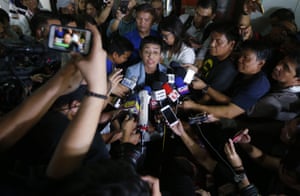
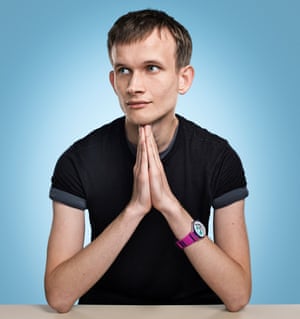
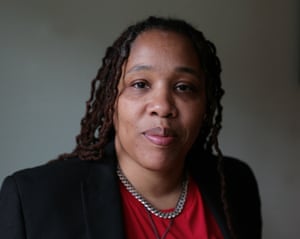
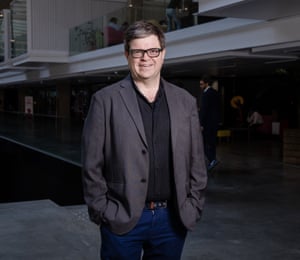
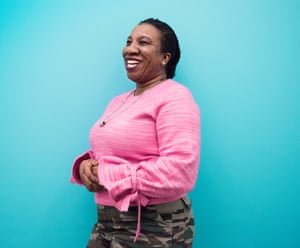
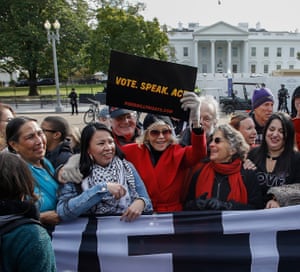
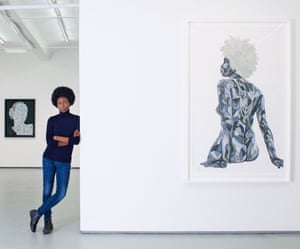
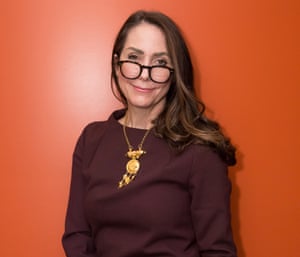
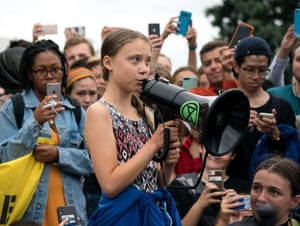
No comments:
Post a Comment